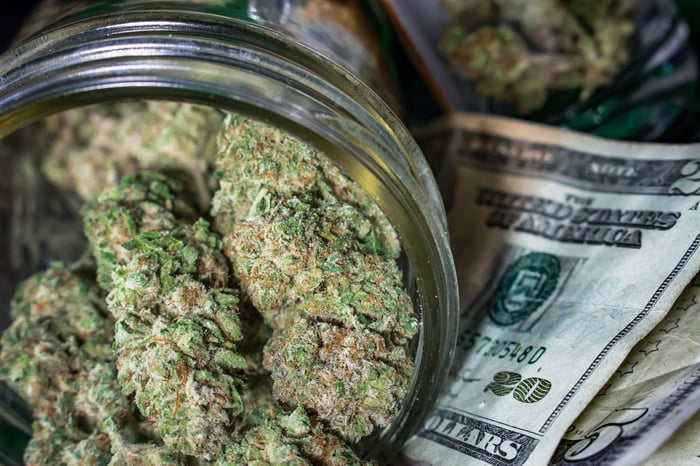5 reasons Canada is facing a marijuana shortage

The marijuana industry has delivered one milestone after another in 2018.
The highlight, of course, was the legalization of recreational cannabis in Canada on Oct. 17, 2018, which ended nine decades of adult-use prohibition. However, we also witnessed two more U.S. states legalize medical pot, which went along with Michigan becoming the 10th state to OK recreational weed use. Add in pot stock uplistings, the first cannabis-derived drug being approved in the U.S., and Tilray becoming the first pot stock to IPO on a reputable U.S. exchange, and you have the makings of a groundbreaking year.
Canada is facing serious cannabis supply concerns
Yet despite all of this, the industry has still had its hiccups. In particular, Canada has run into major supply shortages since legalization. Following more than 12,500 in-store transactions and 30,000 online orders in Quebec on the first day of legalization, SDQC (the branch in charge of managing weed sales in the province) had to remove numerous products from its online store because they were sold out. One location in Winnipeg, Manitoba, had to close its doors just hours after opening because it ran out of product.
Why are Canadian dispensaries and online stores struggling with supply shortages, you ask? Well, don't look to any one specific reason for the answer. Instead, blame it on a combination of five factors.
1. Growers had to be certain about legalization before they ramped up capacity
To begin with, you can point the finger at the Canadian government for waffling on legalization for as long as it did. As long as Canada's Parliament was debating the Cannabis Act, there was no guarantee that it would be approved. It was only in December 2017, when nearly all provinces committed to a two-year tax-sharing agreement with the federal government, that it became clear to growers the bill had a very good chance of passing and becoming a law.
With only medical cannabis being legalized prior to the Cannabis Act, most growers had very little ongoing in the way of capacity expansion. For example, Aurora Cannabis(NYSE:ACB) was only on track to produce a little over 100,000 kilograms annually when the year began. Then it (and other pot stocks) began spending liberally. Two major acquisitions, a huge partnership in Denmark, and multiple organic projects later, Aurora Cannabis could be on pace to yield 700,000 kilograms per year by 2021.
However, it's going to take time for Aurora Cannabis and its peers to up their production. Most marijuana growers are probably a good 12 to 36 months away from hitting their pie-in-the-sky annual production targets. That means reduced output in the interim, and the likely need for investors to reduce their lofty expectations.

2. Access to capital has been challenging for growers
To build on the previous point, another problem in boosting production capacity has been financing. Even though cannabis is now legal in Canada, access to capital still remains dicey, at best. With banks not wanting to face criminal and/or financial penalties, they've mostly chosen to steer clear of the pot industry.
This has left publicly traded pot stocks like Aurora to turn to their most reliable source of funding: bought-deal offerings. A bought-deal offering involves the sale of common stock, convertible debentures, stock options, and/or warrants in order to raise capital. While dilutive in the short and potentially long term, these capital raises do the trick.
Unfortunately, financing for nonpublic growers hasn't been so easy to come by. The lack of financing options has constrained growing capacity for smaller operators, hurting Canada's supply.
3. Cultivation licensing delays have slowed production
The finger of blame can also be pointed squarely at Health Canada, which is in charge of regulating the cannabis industry. More specifically, Health Canada has a responsibility to review and approve cultivation license applications. As reported by Marijuana Business Daily in May, the regulatory agency had a backlog of more than 500 cultivation applications to approve or deny. This figure may have since grown, with more than double the number of cultivation licenses received during the first four months of 2018, compared with the first four months of 2017.
Through Oct. 26, per Health Canada's website, just 132 cultivation licenses had been issued, with most in Ontario (69), British Columbia (30), and Quebec (12). It could take many more months, if not years, for Health Canada to catch up on all of these cultivation license applications.

4. Sales permit delays can be even longer
Just to complicate things even more, Health Canada is also in charge of issuing sales permits. That's right, in addition to cannabis growers needing the go-ahead from regulators to legally plant and harvest marijuana, they also need a permit from Health Canada to sell it. The wait for a sales permit can be just as long, if not longer, than the cultivation license.
Once again pulling from data supplied by Marijuana Business Daily back in May, the average wait to obtain a sales permit was 341 days. That's more than 11 months just to be given the OK to sell already harvested cannabis. No grower has been able to obtain a sales license quicker than CannTrust Holdings, which accomplished the feat in "only" 129 days (just over four months). As with cultivation license delays, these sales permit delays could hinder the amount of product that makes it onto dispensary shelves.
5. Initial euphoria usually drains supply
Lastly, consumers deserve some of the blame.
Although there's little precedence to recreational legalization around the world, we've witnessed similar shortages in Nevada following its legalization in July 2017, and in Colorado in January 2014. These shortages are tied to the initial euphoria consumers felt once cannabis was legalized. Although this euphoria only tends to last a few months, it has a draining near-term effect on supply, which has been geared to meet "normal" demand. This euphoria is probably going to lead to supply concerns for months to come in Canada.
420 Intel is Your Source for Marijuana News
420 Intel Canada is your leading news source for the Canadian cannabis industry. Get the latest updates on Canadian cannabis stocks and developments on how Canada continues to be a major player in the worldwide recreational and medical cannabis industry.
420 Intel Canada is the Canadian Industry news outlet that will keep you updated on how these Canadian developments in recreational and medical marijuana will impact the country and the world. Our commitment is to bring you the most important cannabis news stories from across Canada every day of the week.
Marijuana industry news is a constant endeavor with new developments each day. For marijuana news across the True North, 420 Intel Canada promises to bring you quality, Canadian, cannabis industry news.
You can get 420 Intel news delivered directly to your inbox by signing up for our daily marijuana news, ensuring you’re always kept up to date on the ever-changing cannabis industry. To stay even better informed about marijuana legalization news follow us on Twitter, Facebook and LinkedIn.




